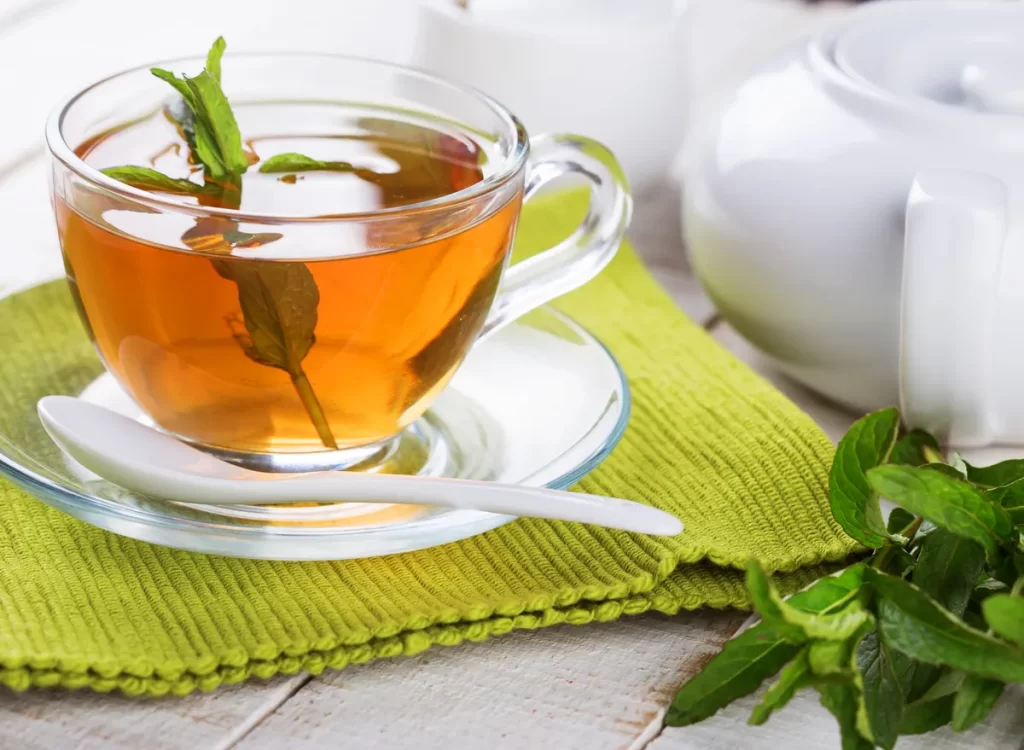Green tea is perhaps among the top renowned superfoods available But what do you know about what’s in your drink?
Green tea is made of leaf material from the camellia sinesis plant, which is similar to all other teas made from nonherbal ingredients. In contrast to the black and oolong (wulong) teas green tea is not as processed because it’s produced by steam-drying methods.
The delicate methods of processing are believed to be one of the main reasons why it is abundant in antioxidants and nutrientsand could bring about a myriad in health advantages. According to National Center for Complementary and Integrative Health (NCCIH), green tea has been utilized as a component of Chinese and Japanese medical practices for thousands of years.
You’ve probably been hearing a lot about the advantages of green tea however, the NCCIH warns that a lot of research isn’t conclusive and that more research is needed. Based in New York, Megan Casper, RDN, is the proprietor Megan Casper Nutrition, a company Megan Casper Nutrition, notes an additional point of caution: “Many studies of green tea utilize extracts of green tea that can be more potent than the typical home tea brew.”
The health benefits associated with green tea could also vary depending on the brand you select, and the method you prepare it, according to Casper. “Hot tea could contain more antioxidants because the majority of iced teas use [fewertea bags and is diluted,” Casper says, but “tea which is brewed cold over several hours is able to provide similar levels of antioxidants as the hot version.” Decaffeinated versions of green tea might have less benefits due to the fact that processing may take away antioxidants.
The latest addition to the market and also being discussed about its potential benefits is matcha tea. Matcha is a blend of ground whole leaves of green tea combined with freshly boiling water. Casper claims that this blend increases the antioxidant content and the caffeine content.
Find out more about the health benefits of green tea, and how this popular beverage can be a great addition to the healthy lifestyle and diet.
Green Tea packs a nutritional Punch
When you choose green tea, you’ll feel confident about the quality of your tea. Here’s what’s in it:
- Caffeine is a kind of alkaloid, has stimulant effects on the nervous system.
- Amino acids, like L-theanine, can help improve the focus of your mind.
- Fluoride is a mineral that aids in strengthening tooth enamel
Different from other kinds of teas, the green variety has significant amounts of compounds known as catechins. The most notable catechin is epigallocatechin-3-gallate (EGCG).
When it comes to choosing healthy green tea New York City resident Natalie Rizzo, RD, gives a helpful suggestion: “If you want the authentic thing, ensure that the packaging states 100% green tea or go for green tea leaves that are pure.”
Green Tea is a Part of a healthy weight loss Diet

The NCCIH states that there isn’t enough evidence to support the claim that drinking green tea can result in weight loss for those who are obese or overweight. However, studies involving extracts from green tea shows that it can aid in weight loss.
The caffeine content in green tea could help reduce appetite and accelerate burning calories via a process known as thermogenesis, according to one study. Be aware that the majority of the research about green tea is based about this higher concentration extract. It doesn’t even involve the tea bag being infused into your drink, as suggested in an article that appeared in May 2014 by The Canadian Pharmacists Journal.
“If you’re thinking about adding green tea into your diet for losing weight, do not be expecting this to be effective in the case of an extremely calorific-rich eating plan.” Rizzo says. “Although it may have properties that burn fat, [green teadoes not have enough power to burn off fat to compensate for an unhealthy diet.” In addition to that according to Mayo Clinic that weight loss strategies using green tea could be hindered by drinking tea made with sweeteners added.
Your best bet? Follow the steps that have been proven to workadhere to a healthy balanced diet and workout often to lose weight. Green tea in your diet might be beneficial, but don’t think that it will be the ultimate magic bullet.
Related: 10 Green Tea Health Benefits
The benefits of green Tea Expand to your belly
A high dose of caffeine can induce anxiety and disrupt your sleep. However, caffeine can also keep you hydrated. If you’re sensitive to the amount of caffeine found in coffee, consider drinking green tea. It too contains caffeine, but not as much as coffee. As per the Mayo Clinic, 8 oz of brewed coffee that is caffeinated is a mixture of 95-165 mg of caffeine. However, 8 oz of green tea is a mixture of 25 to 29 mg caffeine.
Green Tea Can Help Reduce Rheumatoid Arthritis The Symptoms
If you’re seeking to lessen inflammation, you should add Green Tea to the list of items to buy.
In a study that was published in The Journal of Nutrition, rats that were fed green tea extract in drinking water and then infected with the auto-immune illness rheumatoidarthritis (RA) had lesser severe symptoms than rats suffering from RA who consumed plain water. More research is needed on humans, but the researchers suggest that the extract of green tea could be beneficial when combined with standard RA treatment.
The research in a review that was released back in the year 2011 by Arthritis Research & Therapy indicates a similar anti-inflammatory benefit for mice suffering from osteoarthritis. However, it’s not yet clear whether similar effects could be observed in humans.
Green Tea may help repair damaged skin and help protect against Skin Cancer
In a study that was released in February 2010 in Cancer Prevention Research mice exposed to polyphenols found in green tea that were ingested into drinking water demonstrated improved skin cell repair following UV damage from UV rays, however it’s still unclear whether this effect could occur in human.
Green tea can also help treat skin conditions like warts and genital eczema according to an article that was that was published in August 2015 within the Journal of the German Society of Dermatology.
Green Tea Can Help Lower the levels of blood sugar in people who suffer from Type 2 Diabetes.

Type 2 diabetics suffer from elevated levels of blood sugar (hyperglycemia) because of an illness known as insulin resistance. This means that muscles, cells and liver are unable to effectively absorb glucose in order to fuel the body. If diabetes is not properly managed, it could increase the chance of developing complications, such as heart disease and nerve damage (nerve damage) Amputations, eye issues, according to the American Diabetes Association.
However, when it is included in a balanced diet for type 2 diabetes green tea could aid in reducing insulin resistance, according to a study that was published on September 14, 2014, in the Iranian Journal of Medical Sciences. The study found that participants took 150 milliliters sweet or sour green tea 3 times a day for four weeks, saw positive results.
Your alertness and brain health Can be improved by drinking Green Tea
A very sought-after characteristics of green tea, as per the NCCIH is the mental alertness. The short-term effects are linked to the caffeine content in green tea. Caffeine itself acts as stimulant for our central nervous system, and can trigger issues when it is consumed in high quantities. However, the minimal amount of caffeine of green tea can be enough to make you feel awake without the anxiety or anxiety that is associated with products with higher levels of caffeine like coffee.
Green Tea Can Help Protect You Against certain types of Cancer
Cancer occurs when free radicals damage healthy cells within the body. However, antioxidant-rich drinks and foods such as green tea can aid in preventing this according to National Cancer Institute. Particularly the EGCG contents are believed to provide protection.
A study published on February 18, 2018 by Molecules and Cellscites studies that show green tea extract could aid in preventing the onset of and reduce the risk of recurrence certain kinds of cancer. But, most of the research that has been conducted on the relationship between treatment or prevention of cancer and green tea focuses on cells or mice which are not human or green tea extract is not the same as green tea.
Drinking Green (and black) Tea may have a protective effect on the Heart
In addition to its cholesterol-lowering properties In addition, the NCCIH mentions that the tea could also lower blood pressure. This can improve health of the heart, according to the National Heart, Lung, and Blood Institute. Similar effects can be observed when drinking black tea.
If you’re taking blood pressure medication, like beta-blockers, you should take green tea in moderation. A large amount of green tea particularly in its supplemental form, could affect these types of medicines, according to the NCCIH.
Green Tea may help reduce Anxiety, however more research is required.
A cup of green tea can help alleviate signs of disorders relating to anxiety, such as generalized anxiety, obsessive compulsive disorder and social anxiety disorders. A review that was published on October 17, 2017 by the journal Phytomedicinecites studies that suggest caffeine and amino acid L-theanine are able to decrease anxiety and impact other brain functions, such as attention and memory.
Read more:

